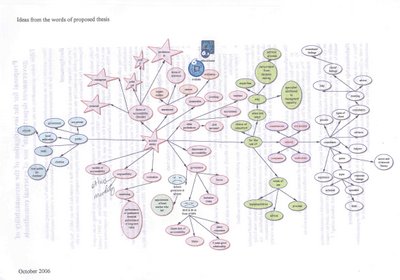I can write reports (I think). I can write computer code, and I know it works when it works. I can write letters and emails. They work because people write back to me. I write blogs (no-one reads them; I never get comments). But essays! Yeuch! It's an art form like a piece of poetry. It has to have a beginning, a middle and an end, but the bit in the middle has to be an argument, but I don't have an argument. I don't have a coherent logical flow to argue. Er, perhaps today's blog could be an essay on why I have to write essays. :(
Here's some advice I've been given on writing essays:
- show the content of the argument
- provide references for assertions (I have to realise that they are assertions first)
- contextualise the points within the broader argument
- add an evaluative dimension
- explore concepts in detail
- create narrative in the argument
- specify how the research question fits into previous research
- provide detail in theoretical account
- emphasise the interpretive nature of qualitative research
- spell out what the assumptions were that underpinned the idea I was discussing
The Writing Center has extensive advice on a number of pages including several on writing essays, arguing, counter arguing and editing.
The ABC of Academic Writing has a set of guides in various hues and tones. It says:
"The word essay means an attempt. Like a single throw in a javelin competition, it should deal with one issue in a unified way."and links to a discussion of argument in an essay.
Then there's the UNC Writing Center on argument.
And OU sites that I have to sign into, such as the OU Knowledge Network eWrite.
I think that the link to the PhD writing skills is most useful.
So you'd think I'd have enough advice ... :(
